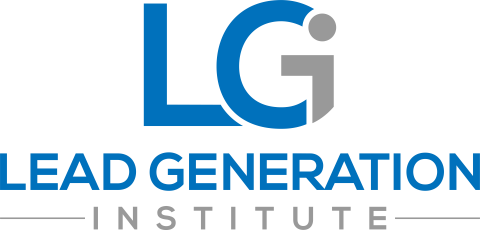Lead generation is a critical component of any digital marketing strategy, regardless of business size or industry. When it comes to B2B organizations, 85% of marketers say that lead generation is their most important goal. That said, lead gen can also be a time-consuming and somewhat challenging task. It’s for this reason that 61% of B2B marketers think generating qualified leads is one of their biggest challenges.
B2B leaders will need to assess the extent of their capabilities and decide whether it will make more sense to build an in-house marketing team or outsource its lead generation efforts. Both options have upsides and challenges. This article will highlight the issues that factor into this choice, be it in-house or outsourcing, to help you make a more informed decision.
What Services Do Lead Generation Companies Provide?
Lead generation is a method of generating consumer interest into a company’s products or services. For B2Cs, lead gen is often, but not exclusively conducted via advertising. With B2Bs, however, more emphasis is placed on a multi-channel approach that includes inbound marketing.
Those that are initially hesitant to outsource their B2B lead generation campaign, either for financial or other reasons, are often surprised by what these companies actually provide. In short, lead generation companies do a lot more than most people think since they often have many tools they employ to deliver meaningful results. While some specialize in one or two areas, most companies offer expertise across a wide range of topics and services.
These can include the following:
- Content marketing and creation
- Email marketing
- Search engine optimization SEO
- Social media marketing
- Event marketing and promotion
- Webinar management and production
- Content Syndication
As we said, B2B lead generation is a complex process, meaning that by outsourcing it, you will not only get more qualified leads and B2B sales but also a whole host of other digital marketing strategies employed for you that facilitate lead generation.
The Pros and Cons of In-House vs. Outsourcing Lead Generation
If you are the kind of B2B company that has already invested heavily in hiring and training an in-house marketing team, or if your teams have enough knowledge and experience, the benefits of outsourcing B2B lead generation are somewhat minimal. After all, in-house lead generation will offer you the most control over lead gen analysis, as well as allow you to make quick decisions or keep a close eye on your team’s progress.
However, if that is not the case for your company, the in-house lead generation will involve hiring at least one person that you need to train and pay for this purpose. It’s also important to remember that effective training will take over 12 months, and there are certain tools, data fees, and other overhead costs to consider.
As such, B2B companies that haven’t yet invested in a digital marketing team will often turn to outsource their lead generation as a means to save time and money. Those whose sales teams are relatively inexperienced will also benefit from the skills, experience, and familiarity of a professional third-party lead generation partner.
When to Outsource Lead Generation and When to Keep It In-House
Among the most important aspects to consider when making this decision is what your team will need. Do they have the necessary resources and experience to implement a comprehensive lead generation strategy?
As such, you’ll probably want to consider in-house lead generation when you can dedicate an experienced and fully funded team to manage your program. However, if you don’t have the necessary resources or your lead generation efforts center mostly on cold calls, appointment setting, and other such inefficient strategies, outsourcing lead generation may be the better option.
There’s also a third option available to you, which is partly outsourcing your lead generation strategy. You could, for instance, focus your in-house marketing team’s efforts solely on content creation and search engine optimization (SEO), while leaving the distribution, marketing, and other aspects to a third-party agency. Obviously, this approach will require a higher degree of close collaboration and synchronization between yourself and your lead generation partner.
The benefits of outsourcing B2B lead generation add up. You can save time on prospecting, identifying, and qualifying leads, which can then be handed down to your best sales team. This will help reduce ramp time and increase overall efficiency. Regardless of which option you choose to use, be it outsourcing, in-house lead generation, or a hybrid of the two, you should never overestimate the benefits or underestimate the costs involved when evaluating what will work best for you.
The Total Cost of Ownership vs. Outsourcing Lead Generation
Aside from staffing, a second key consideration needs to be given to your martech stack and how it all adds up to your total cost of ownership (TCO). A survey from Leadspace and the Marketing Technology Industry Council showed that [bctt tweet=”the average number of martech products in a given stack is 16.” username=”LeadGenInst”] That’s a lot of technology to buy, learn, and manage.
A typical B2B lead generation martech stack will include:
- Content Management System (CMS) – This is a software or set of related apps used to create and manage B2B content as well as content syndication. Some CMSs including WordPress, Drupal, and Hubspot, provide content management features into their larger platform.
- Landing Pages and Web Forms Software – Common features of landing page and web form software include dynamic content, templates, A/B testing, and reporting, as well as email and CRM integration. Wix, Unbounce, and Leadpages are good examples here.
- Marketing Automation Platform (MAP) – MAPs automate many marketing processes, gather customer information, generate a customer profile, personalize messages, and integrate with your email and social media. Marketo, Pardot, and SharpSpring are some platforms to consider.
- CRM Software – CRMs cover a broad set of apps that help businesses manage customer data and interactions, while providing access to business information, and offering marketing and sales automation. Basically, a CRM is a central hub of the entire martech stack. Salesforce, Oracle, or SugarCRM are all options worth evaluating.
- Social Media Marketing – These tools help you create, manage, and track all social media marketing efforts. Hootsuite, Buffer, and PicMonkey are such tools.
- Chat Solutions – These tools provide you with the possibility of providing customer support in real-time, track customer activities on your website, and offer you reporting capabilities. It’s worth checking out Drift, Intercom, and LivePerson.
- Sales Automation – From automated lead research and team analytics to reporting and contact management, sales automation tools try to standardize the sales process. Reply.io, and Outreach are worth considering.
For a more comprehensive marketing stack, a B2B company might also consider the following tools:
- Ad Tech – These digital solutions allow you to supplement organic traffic with paid advertising and increase top-of-the-funnel traffic. Look at Google Ads, Google AdSense, and DemandBase.
- Webinar Software – Webinars are great B2B lead generators. To help you implement them, GoToWebinar, WebEx, or Zoom will do the job.
- Web Analytics and Testing – If your marketing automation platform doesn’t have built-in testing and analytics features, consider using Google Analytics, Kissmetrics, or Crazy Egg.
The costs of purchasing, installing, integrating, licensing, maintaining, insuring, replacing, and upgrading these information technology systems, as well as training your staff to use them can add up to well into thousands of dollars per month. B2B companies, business owners, and decision-makers looking to outsource lead generation or keep it in-house should calculate their TCO and see which option makes the most financial sense.
As a business strategy, the benefits of outsourcing your B2B lead generation will not only include all of these information technology tools, but it will also improve your lead nurturing initiatives, boost your conversion rate, and produce high quality leads for your sales team.
Lastly, Data plays a huge role in your lead generation efforts, and it isn’t cheap. I’m not only talking about contact data that can be used in your email marketing and sales automation campaigns but intent data as well. Intent data helps you focus your campaigns towards companies and prospects who are consuming content related to your products and services.
For example, let’s say you are a marketing agency and you offer lead generation services.
Using Intent Data from Bombora, you can identify companies consuming content related to these services. An example of topics you might want to track include, Sales Leads, Sales Automation, Lead Generation Consulting, Sales Prospecting, Sales Acceleration, Sales and Marketing Automation, Online Lead Generation, Lead Generation Software, Lead Generation Services, Sales Growth, and Sales Operations. The Bombora intent data engine will identify companies who are consuming above average amounts of content related to these topics. They call this a “Surge Report.”
So, instead of marketing to the entire universe, you can use this data to help you focus on companies clearly interested in the topics related to your products and services. While this service is awesome, it’s not cheap. Some lead generation companies include access to this data as part of their service, which can sweeten the deal.
In short, you should evaluate the pros and cons of each, as well as the total cost of ownership, to decide whether to outsource all or part of your lead generation efforts or keep it in-house.
For more information on B2B lead generation best practices, feel free to subscribe to our newsletter and get the latest delivered to your inbox.



